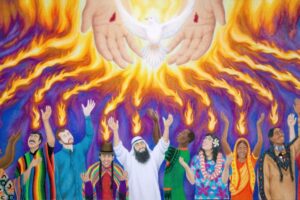Using the inspired Word of God is important in discerning and overcoming the antichrist spirit. In not aligning with Word of God, the antichrist spirit has use false prophets to mislead people. However the church has been using God’s Word as the instrument of discernment to fight and overcome the antichrist spirit (2 Timothy 3:16-17; Hebrews 4:12).
The Inspired Word of God was used in the Early Church to discern the Antichrist.
 Apostles discerned that there were religious leaders at the time of the Early Church, called the antichrist and gnostics, who taught contrary to Scripture that Jesus Christ did not come in the flesh and die for the sins of mankind. The apostle taught what was aligned with the Scripture.
Apostles discerned that there were religious leaders at the time of the Early Church, called the antichrist and gnostics, who taught contrary to Scripture that Jesus Christ did not come in the flesh and die for the sins of mankind. The apostle taught what was aligned with the Scripture.
Based on what the Old Testament words of God said (Isaiah 7:14, 9:6, 53:5; Deuteronomy 21:23, and other O.T. scriptures); and on what the apostles saw as eyewitness of what Jesus Christ did (the four Gospels)—the apostles taught that Jesus, the Son of God, came in the flesh and died for the sins of mankind.
Furthermore, the Apostle John writes: “Many deceivers are entered into the world, who confess not that Jesus is come into flesh. This is a deceiver and an Antichrist” (2 John 7; 1 John 4:1-8).
The Apostle Paul warns against “false apostles, deceitful workers, transforming themselves into the apostles of Christ” (2 Corinthians 11: 13).
The Apostle Peter alerts us that “There shall be false teachers among you…even denying the Lord who bought us…And many shall follow their pernicious ways” (2 Peter 2:1-2). 14).
Early Church Fathers discerned the antichrist and called them gnostics: Early church fathers, who were disciples and successors of the Apostles, called those “Gnostics,” who were of the antichrist spirit. The church Fathers also fought against the teachings of the Antichrist Gnostics. The following excerpts reveal their discernment and spiritual fight with antichrist gnostics. *
- They [the Gnostics] abstain from Eucharist (thanksgiving) and prayer, because they allow not that the Eucharist is the flesh of our Savior Jesus Christ, which flesh suffered for our sins, and which the Father of His goodness raised up. Ignatius: to the Smyrnaeans (A.D. 35-105) ch.6
- On this false principle, it was that Marcion actually chose to believe that He was a phantom, denying to Him the reality of a perfect body. Tertullian (A.D. 198) Ante-Nicene Fathers vol.3 pg.197
- Valentinus, who adapted the principles of the heresy called “Gnostic” …. Writing “the Gospel of Truth,” though it agrees in nothing with the Gospels of the Apostles. Irenaeus (A.D. 180) Ante-Nicene Fathers vol.1 pg.332, pg.429).
Antichrist gnostic writings were suppressed by the early church as heretical. To further limited the spread of these heresies a church council, Synod of Carthage in 394 AD, officially approved 27 New Testament texts as inspired by God. Many orthodox churches were already using these as inspired writings of God. **
The Word of God is being employing in the New Age of Spirituality to discern the antichrist spirit.
 Today’s believers of the inspired Holy Word of God continue the task of discerning and fighting the antichrist spirit and its false teachings which began in the Early Church. Recently, the antichrist spirit has been working through people like those of the New Age/New Spirituality movement, to distort and undermine the true gospel of our Lord and Savior Jesus Christ.
Today’s believers of the inspired Holy Word of God continue the task of discerning and fighting the antichrist spirit and its false teachings which began in the Early Church. Recently, the antichrist spirit has been working through people like those of the New Age/New Spirituality movement, to distort and undermine the true gospel of our Lord and Savior Jesus Christ.
Until recently (when in 1945 a cache of early gnostics writings, named the Nag Hammadi Library was discovered in Egypt in a cave) much of what was known about early Gnostics leaders and their beliefs were written by early orthodox Christian church fathers. However, understanding the recently found antichrist gnostic writing in light of the biblical Word of God can help us discern how the antichrist spirit may use the recently found writing in the New Age/Spirituality movement.
Writing the introduction of The Nag Hammadi Library, edited by James M. Robinson, Elaine Pagels makes the following observations about the Gnostic Scriptures:
“According to its title, it contained the Gospel According to Thomas; yet unlike the gospels of the New Testament, this text identified itself as a secret gospel”
“Bound unto the same Volume with it is the Gospel of Philip, which attributes to Jesus acts and sayings quite different from those in the New Testament”
“These diverse texts range, then from secret gospels, poems, and quasi-philosophic descriptions of origin of the universe, to myths, magic, and instructions for mystical practice.”
The Gnostic Society Library states in an article, The figure of Error in the Gospel of Truth: * “The Gospel of Truth is one of the most important Valentinian works discovered as part of the Nag Hammadi cache. The work is not a gospel in the sense of an account of the deeds and sayings of Jesus. Instead it represents an extended homily or meditation on the Gospel and on Christ.”
This article contains the following teachings:
- Gnostics do not believe in the original sin of Adam and Eve.
- They do not believe in the atoning blood and death of Jesus Christ.
- They teach that sin is ignorance of one’s “Godself.”
- And they say that salvation comes through arriving to a knowledge(gnosis) of one’s “higher self” with the help of “Messengers of Light.”
 In our continuing to use the inspired Word of God to discern the antichrist spirit we are assured of our overcoming this spirit of darkness which attempts to distort the Word. God’s inspired Word says we overcome by “the blood of the lamb” and the “Word” (Ephesians 6:12-18; Revelation 12:11).
In our continuing to use the inspired Word of God to discern the antichrist spirit we are assured of our overcoming this spirit of darkness which attempts to distort the Word. God’s inspired Word says we overcome by “the blood of the lamb” and the “Word” (Ephesians 6:12-18; Revelation 12:11).
www.earlychristiandictionary.com *
www.churchhistory101.com ** How the New Testament Canon was Formed
http://gnosis.org/library/valentinus/Error_GTruth.htm ***







